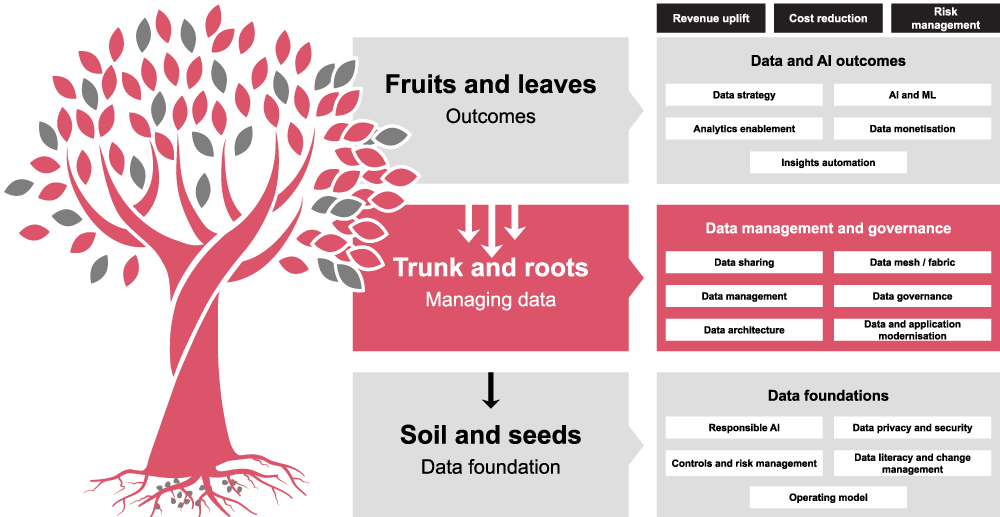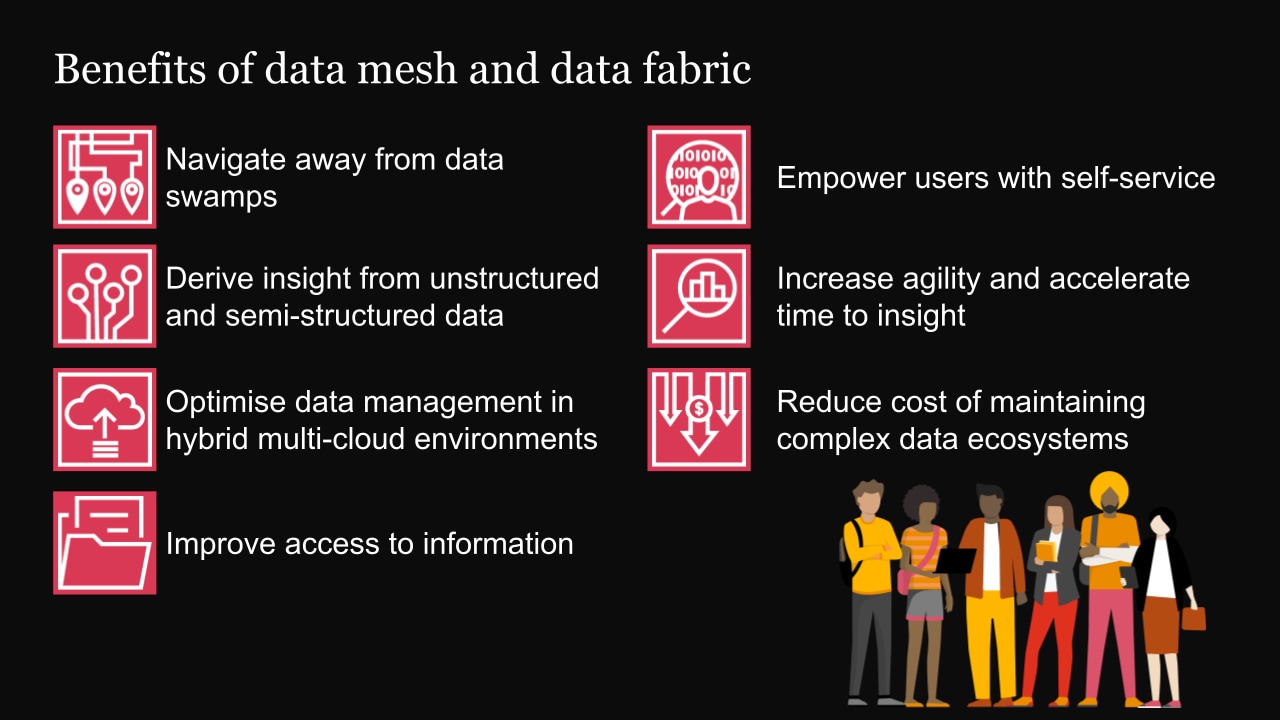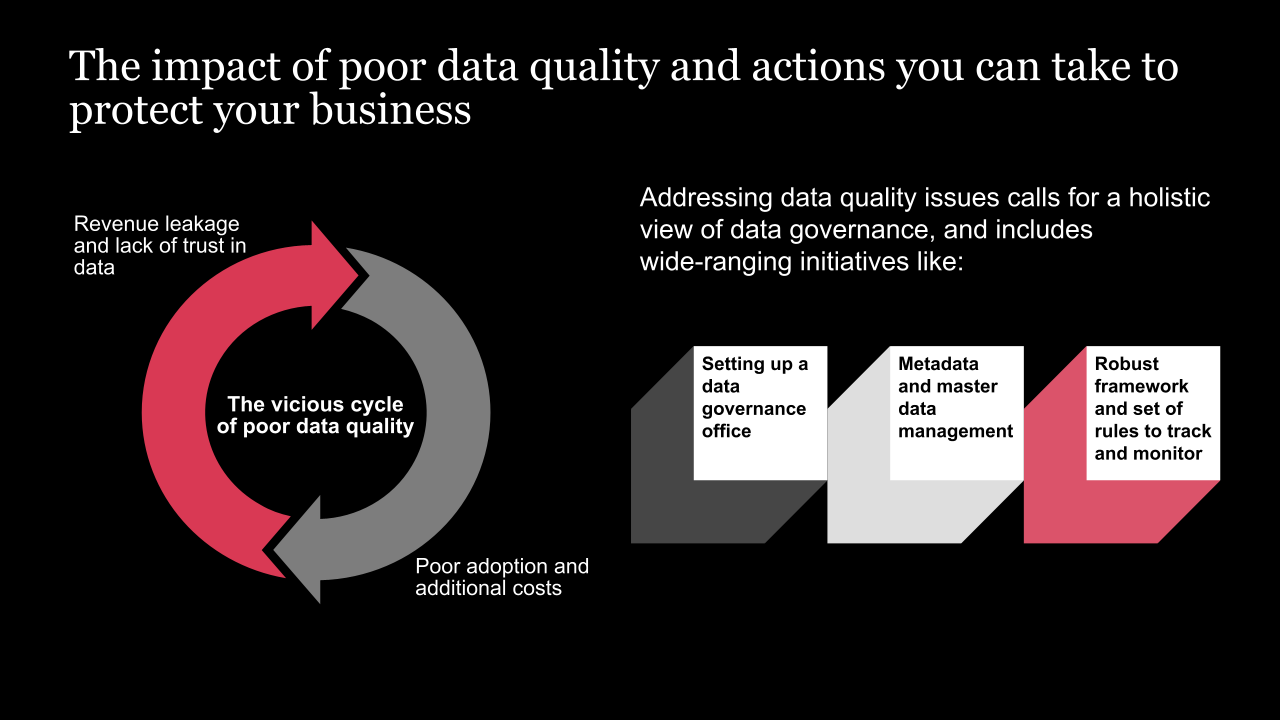{{item.title}}
{{item.text}}

{{item.text}}
Data-driven decision making allows organisations to devise more effective strategies and operations and gain a competitive advantage.
To enable data-driven decisions, strong data governance systems and practices need to be in place. PwC Singapore has joined hands with Alation to host this hands-on workshop, bringing together PwC Singapore's extensive experience in implementing Alation across diverse industries and Alation's powerful platform for data cataloguing, governance, and curation, designed to equip you with the tools and knowledge to maximise the value of your data assets.
Data management and governance has evolved significantly over the past few years. Initially, it primarily revolved around defensive data strategies aimed at ensuring regulatory compliance and mitigating risks. However, enterprises in less heavily regulated industries (like retail) with an offense oriented data strategy have also come to recognise the broader importance of governance in driving business value.
However, data management cannot have a one-size-fits-all approach. It is crucial to work closely with diverse stakeholders to understand their unique business needs, industry dynamics, and risk tolerance levels. Effective data management boils down to tailoring data governance strategies that strike the right balance between control and agility and facilitating innovation while safeguarding data assets.
Our services encompass a range of capabilities designed to help organisations navigate the complexities of data management and governance. We assist enterprises in developing robust data governance frameworks, modern architectures as well as data sharing principles that align with regulatory requirements while also facilitating endeavours of data leaders to enable data-driven decision-making. By strategising and implementing effective data management practices, we help businesses build trust in data by integrating data quality, integrity, and security throughout its lifecycle.
Data sharing is a stepping stone towards achieving data monetisation, which can deliver a direct business benefit by impacting your top line. However, organisations typically face a variety of barriers when there is an intent to share or acquire data externally as well as internally:
We help you first define your data sharing goals aligned with the overall data strategy and then help you along your data sharing journey:
The depth and level of detail required at each stage depends on the maturity of each party involved, as well as the nature of the data sharing engagement and type of data being shared.
PwC Singapore has proudly supported The Association of Banks in Singapore in launching the Data Sharing Handbook:
Organisations face multiple challenges in today's world where volume, variety, complexity and velocity of data is ever increasing.
Data management architecture challenges can be addressed by looking at some of the next-generation sociotechnical approaches and architectures like data mesh and data fabric. However, there’s no silver bullet. 50% of IT managers in companies with a federated model are unsatisfied with synergies in data and analytics operations - which are easier to facilitate in a more centralised operating model, according to PwC’s Data Mesh Research (2022).
We help you formulate a clear data strategy as well as perform an objective enterprise readiness assessment. Once this is done, setting up the operating model and managing change are other crucial activities we do, besides working on setting up the right tools, architecture, governance, and project management office (PMO) practices.
Enterprise data management is not a new discipline, but its significance has grown exponentially in recent years in line with rapid digitalisation in order to make both data collected within the company and relevant external data as usable as possible. It is also crucial for ensuring regulatory compliance and avoiding costly penalties.
As a data leader, there is a need for you to understandably meet leadership expectations on generating outcomes through initiatives like analytics use cases and data monetisation. However, in order to truly support and scale those outcomes, having a robust data management practice is essential. This helps your stakeholders to have trust in the data you want them to use.
With our vast experience in this area and proven data management and governance frameworks, we bring your data strategy to life and help you reshape the way you do business and think about data.
Learn how we transformed a large general and life insurer’s data management and governance capabilities across Asia:
Poor data quality results in poor business decisions. We leverage on our deep techno-functional expertise in data governance, coupled with extensive advisory experience with clients across the region to deliver holistic solutions that help you achieve the desired outcomes. Whether you are looking for regulatory compliance or improving and tracking data quality, our team of experts can support you by providing pragmatic advice and trusted solutions.
Nimble, data-driven enterprises need a modern data architecture to deal with diverse data needs and assets. There is an ever-growing need to speed up data processing and analytics, drive innovation and lower costs, while complying with regulations.
But keeping up with changing times (and technological disruptions like LLMs) isn’t as easy as it sounds. By strategizing and implementing robust data architecture solutions tailored to your unique needs, we ensure that your data is organised, integrated and accessible. Thus, it eventually helps your systems and people to leverage data more strategically and derive tangible business outcomes.
Technical and data debt incurred due to running legacy data and application systems stymies your path to become a data-driven organisation in several ways.
Combining our extensive industry knowledge with deep technical capabilities, we’ll help you modernise your infrastructure and make you future-ready. We help you reduce your technical debt and put your business on a path to modernisation - no longer hindered by complex, difficult-to-manage legacy systems. Benefit from efficient workflows and processes, better insights and analytics ecosystem for decision-making, higher agility and performance, as well as improved user experience.
{{item.text}}

{{item.text}}



